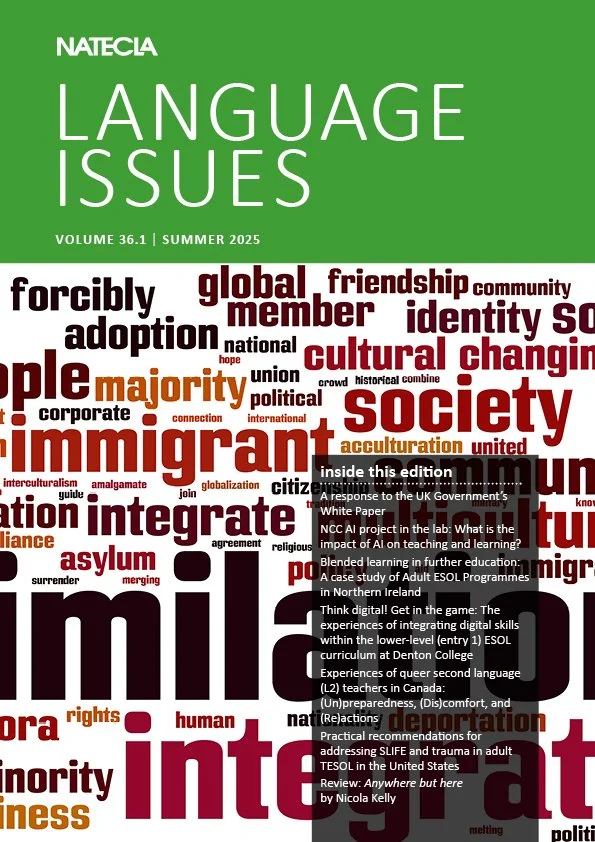
Language Issues journal
Language Issues is NATECLA's part peer-reviewed journal for language teaching professionals.
What is Language Issues?
The journal, edited by Declan Flanagan, explores the area between academic research and classroom practice, discussing teaching, training, management and research into ESOL and community languages. Language Issues looks at broad issues and big ideas and is an invaluable resource for teachers, students, researchers and policymakers.
All articles can also be accessed via IngentaConnect.
Please contact NATECLA to:
Request a copy of the latest edition
Subscribe to Language Issues
Contribute to Language Issues (including the blog)
Buy individual articles or a copy of Best of Language Issues
Are you a member?
You will receive an email with the link to the latest edition (PDF).
Alternatively, you can find it in the Media Library on the NATECLA Members’ Platform.
Subscribe to Language Issues
-

Existing personal member?
A Language Issues subscription is one of your benefits. New editions are published electronically twice a year. They will be shared via the media library of our Members’ Platform and email.
-

Part of one of our member institutions?
If you’ve been added as a staff member of your institution to our member platform, you will be notified when new editions are published. Contact your manager for more information, or…
-

Non-member subscriber
Universities and other research institutions can subscribe to Language Issues’ two electronic editions from only £90 per year. We will send you a PDF to upload to your library catalogue and you can access the journal via IngentaConnect.
The latest issue: Summer 2025 - 36.1
In the latest edition of Language Issues you can read:
‘A response to the UK Government’s White Paper, Language Issues Editorial Team
NCC AI project in the lab: What is the impact of AI on teaching and learning?, Viorica Lucuta
Blended learning in further education: A case study of Adult ESOL Programmes in Northern Ireland, Andrew Porterfield
Think digital! Get in the game: The experiences of integrating digital skills within the lower-level (entry 1) ESOL curriculum at Denton College, Sara Khan
36 Experiences of queer second language (L2) teachers in Canada: (Un)preparedness, (Dis)comfort, and (Re)actions, Robert Grant
48 Practical recommendations for addressing SLIFE and trauma in adult TESOL in the United States, David Housel
Previous Articles
-
‘Yes, what about me?’. A workshop that changed me as an ESOL tutor - May Milton
Innovative programme: dual qualification in English as an Additional Language (EAL) and health services vocational qualification in Australia - Jyoti Sharma
English as a dynamic language and speaker depiction in ESOL resources - Tiantian Han
Using Study Diaries with Lower Proficiency ESOL Learners -Mathew Ashcroft
Island voices – Guthan nan Eilean – Hebridean language capture and curation, 2005–2023: an overview - Gordon Wells
Ways to enhance ESOL lecturer diversity in Scottish FE colleges: practical solutions from the lecturers’ perspective - Paula Barrowcliffe
Multilingualism in ESOL classrooms: An opportunity or a challenge? - Josianne Block
BOOK REVIEW: The teacher gap, Allen, R and S. Sims - Linda Ulrich.
-
Editorial - Declan Flanagan
NATECLA’s response to the Coalition for Language Education
PEER REVIEWED ARTICLES
Language learning motivation and the ESOL exam system in England - Kathryn Sidaway
Crafting anti-colonial pedagogy in English language learning - Sara Carpenter, Bahar Biazar, Shirin Haghgou
‘Who am I to teach you?’: Critical reflection in the ESOL Classroom - Orsolya Dunn
REFLECTIVE/INFORMATIVE PRACTITIONER ARTICLES
Learner autonomy in ESOL education: embracing digital skills and pedagogy - Sara Khan
Confronting persistent errors in the ESOL Classroom: a cognitive approach - Salma Altabari
American ESOL instructors reflect on continuous professional development - David A. Housel
The critical role of attitude in language learning: Improving teaching practice by reflecting on my experience as a student - Charlie Taylor
Island voices – Guthan nan Eilean – Hebridean language capture and curation, 2005–2023: an overview - Gordon Wells
NATECLA CONFERENCE (2023) SHOWCASE REPORTS
Cultural identity and diversity through story writing and reading in an ESOL community classroom in Belfast, Northern Ireland: a practitioner’s reflection - Juana Simpson
The Bell Foundation workshop report; The Bell Foundation: ESOL research, policy and implementation - Philida Schellekens and Silvana Richardson
-
Editorial - Declan Flanagan
PEER REVIEWED ARTICLES
‘It’s like we’ve gone backwards’: perceptions of Scottish ESOL policy - Steve Brown and Mark Sheridan
REFLECTIVE/INFORMATIVE PRACTITIONER ARTICLES
Agency, barriers, and equality: women’s access to ESOL - Holly Dono
Towards a greener ESOL: creating sustainability in teaching and learning - Mafalda Giudice and Viorica Lucuta
NATECLA CONFERENCE (2023) SHOWCASE REPORTS
An emergent curriculum for ESOL: concepts, tools and challenges - Sam Shepherd
Challenging stereotypes of adult learners in mathematics - Jenny Stacey
ESOL and progression pathways - Angela Palmer
Sustainability in ESOL: what stories can we tell to help others embrace it? - Carol Samlal
How can we make ’international women’s group’ better? What insight can be gained from collecting informal feedback online from refugee learners of ESOL - Amna Smith
Thinking differently for the future of the planet: UNESCO Key competencies for sustainability: what are they, and how can we incorporate these competencies into teaching ESOL - Ann Cowie
BOOK REVIEW
English Language Teaching: Now and how it could be Geoff Jordan and Mike Long, 2022. Reviewed by Linda Ulrich
-
Editorial - Declan Flanagan
ARTICLES
What an ESOL teacher can learn by being a language student - Helen Pennington
The unbearable load on the English vocabulary - Vandana Raku
Supporting refugees – when reaching the destination is not the end of the journey -Marcin Lewandowski and Ana Andronic
The 25th anniversary of the Good Friday Agreement, education and ESOL provision in Northern Ireland - Declan Flanagan
‘Most important is being safe’: ESOL learners’ priorities for their lives in Britain - Jill Court
REVIEWS
‘Oral Literacies: When adults read aloud’ by S. Duncan. Reviewed by Linda Ulrich
-
Editorial - Naeema B Hann
ARTICLES
Digital exclusion and support for language learning, literacy and digital literacy for ESOL learners during the pandemic - Ann Mills
English Talk Time across Kirklees libraries - Marcin Lewandowski and Mazhar Iqbal
Teaching English the Yorkshire Way? About Migrant English Support Hub (MESH) - Catherine Hemmings and Angela Palmer
PEER REVIEWED
What did Skills for Life ever do for us? - Sam Shepherd
REVIEWS
SLA applied: connecting theory and practice – Brian Tomlinson and Hitomi Masuhara. Reviewed by Ann Cowie
Understanding context in language use and teaching: an ELF perspective – Eva Illés. Reviewed by Linda Ulrich
-
Editorial - Naeema B Hann
ARTICLES
Harnessing autonomy – exploring the potential of autonomy supportive classroom environments - Marcin Lewandowski
A collaborative ESOL – Global Learning Project - Seima Mahmood
Reimagining teaching practices in an adult ESOL classroom using a worldbuilding framework - Whitney Strohmayr and Davey Jones
Towards a trauma informed ELT pedagogy (republished) - Aleks Palanac
Collaborative writing (republished) - Angie Simms
OBITUARY
Christina Healey - Sheila Rosenburg
-
Editorial - Naeema B Hann
ARTICLES
Teaching ESOL to victims of trauma and trafficking - Joy Vee
Emerging from the pandemic: reflections for the ESOL sector - Laila El-Metoui and Dr Nafisah Graham-Brown
Checking understanding and engaging online students when cameras are off - Caitlin Coyle
ESOL in the times of pandemic – getting the full picture - Marcin Lewandowski
PEER REVIEWED
Which model of synthesized English do English teachers want for a lingua franca? - Cynthia Grover
Exploring the language orientations of third-sector ESOL teachers in London towards translanguaging - Daniel Calvert
REVIEWS
Language and migration - Tony Capstick
-
Editorial - Naeema B Hann
ARTICLES
Life skills for ESOL learners in the era of COVID - Emily Bryson
Citizen literacy: reading and writing for everyone - Diane Gardner
Widening access to higher education - Carol Irvine, Celia Fisher
I say, you say: regional pronunciation matters - Amanda Avison
PEER REVIEWED
Which model of synthesized English do English teachers want for a lingua franca? - Cynthia Grover
Come online with me: evaluating the efficacy of an informal cooking and ESOL project’s transfer to online delivery in the time of COVID19 - Clare Courtney
‘While-observation’ discussions: using text-based synchronous chat to scaffold ESOL trainee-teachers’ reflective noticings during teaching practice - Cathy Clarkson
Attitudes of further education ESOL teachers towards teaching mixed-ability ESOL classes in the UK - Kamil Grzegorz Gwozdz
Illustrating students’ perceptions of real-time online English lessons: an activity theory perspective - Wing Wu
Integrated circles and learner autonomy in the adult ESOL classroom - Sarah Peters
Using language outside the classroom as a refugee English language learner - Ally Shepherd
REVIEWS
Teaching adult immigrants with limited formal education: theory, research, and practice - Jenna A Altherr Flores and Nicole Pettitt
Translanguaging as transformation: The collaborative construction of new linguistic realities - Dobrochna Futro
OBITUARIES
A tribute to Helen Casey - Sally Bird
Carol Irvine: In remembrance - Carole MacDiarmid and Anneli Williams
-
Editorial - Naeema B Hann
ARTICLES
Harnessing autonomy – exploring the potential of autonomy supportive classroom environments - Marcin Lewandowski
A collaborative ESOL: Global Learning Project - Seima Mahmood
Reimagining teaching practices in an adult ESOL classroom using a worldbuilding framework - Whitney Strohmayr and Davey Jones
Towards a trauma informed ELT pedagogy (republished) - Aleks Palanac
Collaborative writing (republished) - Angie Simms
OBITUARY
Christina Healey - Sheila Rosenburg
Accessing the Language Issues back catalogue online
NATECLA uploads all editions of Language Issues to the IngentaConnect platform meaning that members can search for and download articles from all editions of the publication since 2013 for free.
Articles are on an extensive range of topics related to delivery, research and management of ESOL, including vocabulary, grammar, feedback, action research, working with refugees and asylum seekers, linguistics, digital ESOL, learner autonomy, community languages, ESOL policy, cultural identity and so much more.
The list really is endless!
So if you’re working on a masters or PhD thesis, a piece of action research or simply want to read up on a particular topic area for your own CPD, register to access the IngentaConnect platform by completing this short form.
Useful guides to help you activate your free NATECLA subscription for the IngentaConnect platform:
Interested in writing for Language Issues?
The Editorial Board for Language Issues invites articles to be submitted for consideration.
We are interested in articles on all aspects of teaching and learning ESOL and other community languages - policy, social and political issues, practical teaching, language research, linguistic features, teacher training, resources and other related topics.
We welcome research contributions from academics and practical and personal perspectives from teachers and learners.
NATECLA welcomes proposals for contributions to Language Issues for the following journal sections - student contributors are also welcome.
Refereed articles
Non-refereed articles (especially from practitioners)
Interviews with ESOL & community languages professionals/language experts
Reporting ESOL and community language research (by research students -- Masters, EdD, PhD, post-doctoral)
Book/conference reviews
'Voices from the ESOL and community languages classroom.
Contact editor Declan Flanagan to find out more.
Potential contributors new to writing for publications will be supported, where possible, by members of the Editorial Board.
Useful documents for Language Issues contributors
Perhaps you have conducted some research that you would like to report to the ESOL community or have read a book recently that would be invaluable to NATECLA members.
Take a look at the following documents:

The Language Issues blog
The blog is a separate entity to both the Language Issues journal and NATECLA but can serve as a stepping stone before writers commit to something more formal in the Language Issues journal. The blog is a free resource for all ESOL practitioners.
While the journal is for members only the Language Issues blog is available to all ESOL practitioners and offers a range of posts which vary from reflections on the NATECLA conference, classroom practice, research and policy. The blog posts are generally shorter than articles for the journal and can be a great way to start off your writing journey as well as being easily accessible. They can be fairly informal in tone and if appropriate we can include photos and links. The frequency of posts varies a little but we are always keen to see more so do get in touch if you want to find out more.




